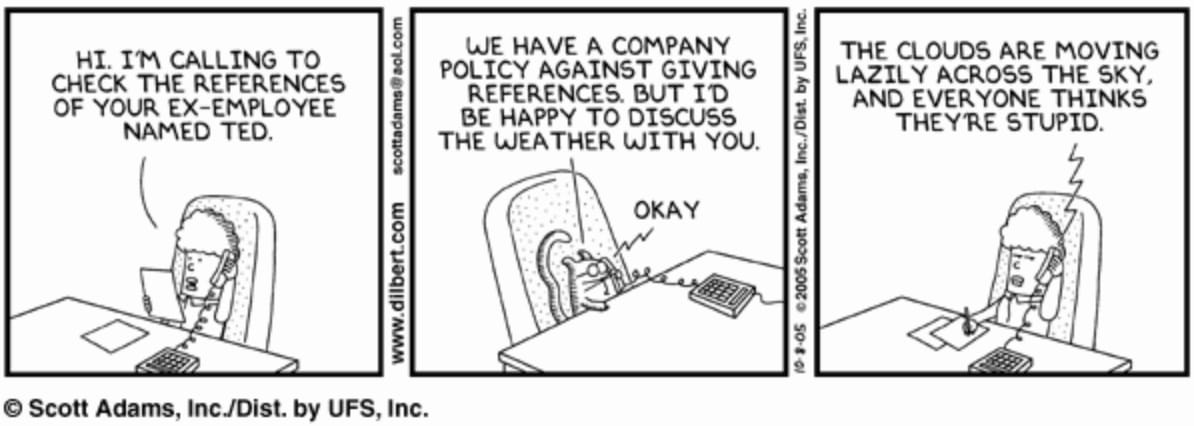20 Must-Ask Employment Reference Check Questions
Want to make sure your next hire is a rockstar employee? Look no further than these 20 must-ask employment reference check questions! Don't let a bad hire slip through the cracks.


Many employers struggle with making informed hiring decisions. It can be tough to get a clear sense of a candidate's fit for your organization based on their application materials and interview performance alone.
That's where reference checks come in.
Nearly 70% of employers have changed their minds about a candidate after conducting a reference check.
Speaking with a candidate's references can provide valuable insights into their work history, performance, and character, helping you to make an informed hiring decision and reduce the risk of a bad hire.
Before going into what questions to ask, let's first understand why you should conduct reference checks.
Why should you conduct reference checks?
So you might be wondering, why the heck should we bother with reference checks? Well, there are actually several good reasons why you should conduct reference checks for your job candidates.
- Verify candidate’s history: First of all, reference checks can help you verify a candidate's work history and credentials, making sure that they actually have the experience and qualifications they claim to have.
- Verify candidate’s skillsets: They can also help you confirm a candidate's skills and abilities, giving you confidence that they can perform the job successfully.
- Insights on candidate’s personality: You can get insights into their personality and work style, which is super helpful when it comes to finding a good fit for your team and company culture.
- Identify potential red flags: Perhaps the best reason of all is that reference checks can help you avoid the nightmare of hiring the wrong candidate. By identifying any potential red flags, such as a history of poor performance or conflicts with colleagues, you can avoid making a costly mistake that could hurt your business.

Steps to take to conduct a thorough reference check
- Get permission: First things first, make sure you ask the candidate for permission to contact their references. It's always a good idea to be respectful and let them know what you're planning to do.
- Plan your questions: Take some time to think about what you want to ask the references. You want to ask open-ended questions that will give you a good sense of the candidate's work history, skills, and personality.
- Reach out to the references: Once you've got your questions ready, reach out to the references via email or phone. Introduce yourself and explain that you're conducting a reference check for the candidate. Verify their identity.
- Ask your questions: Start asking your questions and listen carefully to the answers. If the reference raises any concerns, be sure to ask follow-up questions to get more information.
- Follow up with the candidate: After you've completed the reference check, make sure to discuss your findings with the candidate. If there were any concerns or red flags, be sure to address them.
What questions to ask references?
Now that we know the importance of conducting reference checks, the next step is determining what questions to ask references. Here are some generic reference check questions you can ask irrespective of the job role you are hiring for.

Professional Reference Check Questions
- Can you confirm the candidate's job title, duties, and responsibilities?
- How long did the candidate work for your company?
- What was the candidate's reason for leaving your company?
- How would you describe the candidate's work ethic and performance?
- Did the candidate work well independently and as part of a team?
- Can you provide an example of a project the candidate worked on and their contributions to its success?
- How did the candidate handle stress and tight deadlines?
- Did the candidate show initiative and take on additional responsibilities?
- Would you hire this candidate again?
Personal Reference Check Questions
- How long have you known the candidate?
- In what capacity have you worked with or known the candidate?
- Can you describe the candidate's personality and character?
- How would you describe the candidate's communication and interpersonal skills?
- How does the candidate handle conflicts or difficult situations?
- Can you provide an example of a time when the candidate showed leadership qualities?
- How does the candidate handle feedback or constructive criticism?
- How does the candidate manage their time and prioritize tasks?
- Can you describe the candidate's hobbies or interests outside of work?
- How would you describe the candidate's overall reliability and trustworthiness?
Remember to ask open-ended questions that allow the reference to provide detailed responses. This will give you a better understanding of the candidate and help you make informed hiring decisions.
Tips to conduct reference checks
Here are some tips for asking effective questions in both categories (personal and professional) of reference checks:
Professional Reference Check Questions:
- Be specific: Ask questions that are specific to the candidate's job responsibilities, such as how they handled difficult situations or how they collaborated with team members.
- Ask about work habits: Ask questions that provide insight into the candidate's work habits, such as punctuality, attendance, and ability to meet deadlines.
- Ask about growth: Ask questions that help you understand how the candidate has grown professionally over time, such as what new skills they've developed or what challenges they've overcome.
Personal Reference Check Questions:
- Build rapport: Take the time to build rapport with the reference before asking personal questions, as they may be more likely to share honest feedback if they feel comfortable with you.
- Respect boundaries: Be respectful of the reference's boundaries and don't ask intrusive or overly personal questions that they may feel uncomfortable answering.
- Ask about character: Ask questions that provide insight into the candidate's personal qualities and character, such as their integrity, reliability, and ability to work well with others.
Important Tip:

When you ask someone to be a reference for a job candidate, they might be inclined to give glowing reviews because they want to be nice.
But here's the thing: you want to make sure that the reference is actually being honest and providing valuable insights about the candidate. One way to do that is by asking the reference to compare the candidate to other people they have worked with.
By creating this sense of competition, you're essentially asking the reference to rate the candidate's abilities in comparison to others they have worked with. This can help provide a more objective assessment of the candidate's strengths and weaknesses, rather than just hearing generic praise.
On a final note
The key to asking effective reference check questions is to be prepared, ask open-ended questions, and listen carefully to the reference's responses.
By taking the time to conduct thorough reference checks, you can make a more informed hiring decision and increase the likelihood of a successful hire.
FAQs
How many references should I ask for?
It's recommended to ask for at least 2-3 references.
What should I do if a reference is difficult to reach?
Keep trying to contact the reference or ask the candidate for additional references.
What kind of questions should I ask in a reference check?
Ask questions that are specific to the candidate's job responsibilities and work habits.

